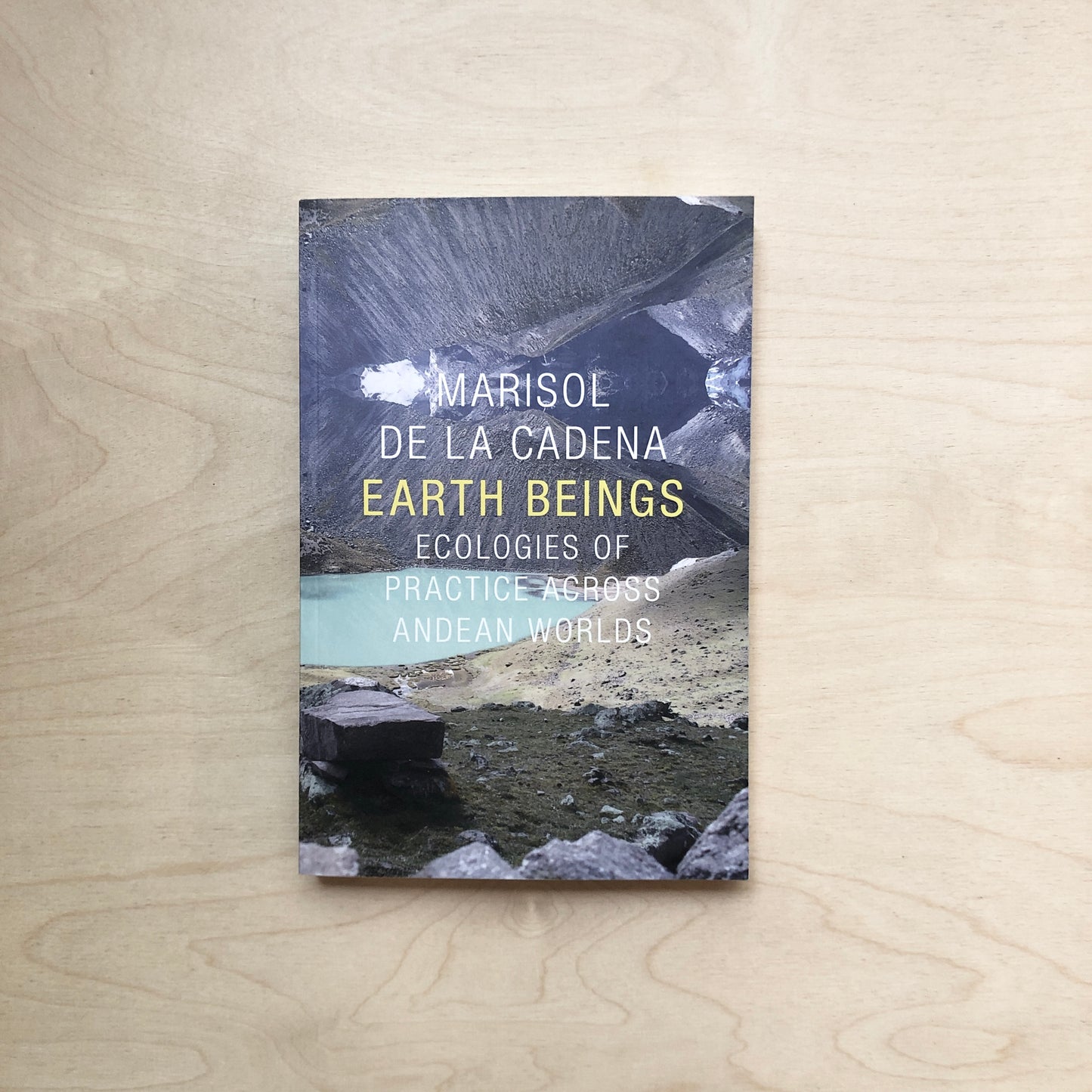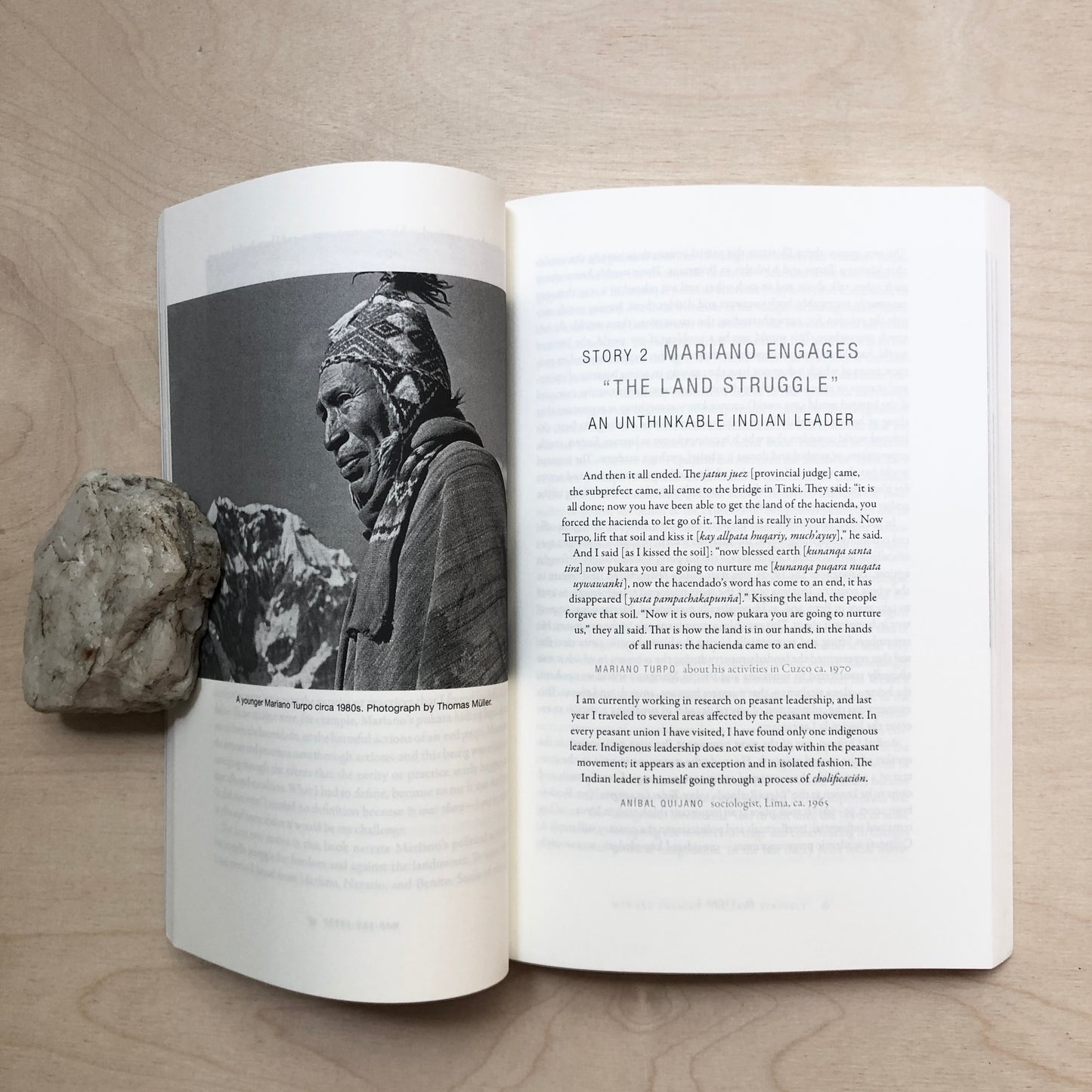Earth Beings: Ecologies of Practice across Andean Worlds
Earth Beings: Ecologies of Practice across Andean Worlds
Marisol de la Cadena
Duke University Press
2015
9780822359630Softcover
23 x 15 x 2
368 pages
Normaler Preis
38,00 €
Normaler Preis
Verkaufspreis
38,00 €
Grundpreis
pro
inkl. MwSt.
Verfügbarkeit für Abholungen konnte nicht geladen werden
Earth Beings is the fruit of Marisol de la Cadena's decade-long conversations with Mariano and Nazario Turpo, father and son, runakuna or Quechua people. Concerned with the mutual entanglements of indigenous and nonindigenous worlds, and the partial connections between them, de la Cadena presents how the Turpos' indigenous ways of knowing and being include and exceed modern and nonmodern practices. Her discussion of indigenous political strategies—a realm that need not abide by binary logics—reconfigures how to think about and question modern politics, while pushing her readers to think beyond "hybridity" and toward translation, communication that accepts incommensurability, and mutual difference as conditions for ethnography to work.
Praise
"While theoretically sophisticated, the book’s concrete language and brief introductory asides make it suitable for advanced undergraduates unfamiliar with its core concepts." — Carwil Bjork-James, Anthropological Quarterly
"This book forces us to rethink the world as we know it, and the tools that we deploy to know it. In contrast to the dominant ontology informed by a nature-culture divide, the stories and struggles of Mariano and Nazario oblige us to defamiliarize ourselves from this divide and consider how we experience ourselves in the world and how the world experiences us along with the ethical and political implications of these interdependences." — Beatriz Cardona, Journal of Iberian and Latin American Research
"Earth Beings is essential reading for those following current research on relational ontologies and the importance of other-than-human contributions to society (ayllu) by encouraging us to think about how beings, places, knowledges, and power interact, particularly in the Peruvian Andes, but in a way that is relevant to much of South America and beyond.... [T]he exceptional ethnographic narratives and the clarity of writing make this a monograph that could be incorporated into a senior undergraduate or, more likely, a graduate level anthropology, geography, environmental studies, political sciences, or Indigenous studies class." — Katherine MacDonald, Canadian Journal of Latin American and Caribbean Studies
"It matters which stories tell stories. A leader in rethinking the partial connections and excessive entanglements of state and indigenous worlds in the Andes and beyond, Marisol de la Cadena writes stories that make this simple aphorism lively indeed. It matters which stories normalize other stories and which build the power in recursive retellings and reworkings to gnaw at the established order of things in vexed worlds. Especially when material stories are also told by earth others, exacting their reciprocal consequences on both state and indigenous human actors, what is at stake is not cultural diversity or epistemological relativism, but something much closer to worlding, to composing and decomposing some worlds and not others with unexpected partners. Earth Beings helps me rethink these matters through the churning of a mountain." — Donna J. Haraway, author of When Species Meet
"De la Cadena's Earth Beings reads, from start to finish, as a labor of love. . . . Each page is dense with insights about the intricacies and challenges of collaborative politics." — Emily Yates-Doerr, Medicine Anthropology Theory
"De la Cadena’s book is an important read and a profound application of contemporary theory to Quechua struggles in South America. It is a moving yet challenging read where the discussions, specifically on cultural politics and representation, can be applied in numerous Indigenous contexts to better transform the relational mode of interactions and divisions between nature, humans and other- than- human entities within a political realm." — Agnieszka Pawlowska-Mainville, AlterNative
"This remarkable work offers vital evidence toward the subaltern studies project of critically re-thinking the written history of subordinate peoples." — Carwil Bjork-James, Anthropological Quarterly
"Earth Beings is a powerful ethnography, the result of more than a decade of fieldwork in the Peruvian Andes.... [T]he reader can visualize the changes in the political opportunities for indigenous peoples in Peru’s political trajectory from liberalism to socialism to, most recently, the neoliberal multiculturalism of the new millennium." — Anita Carrasco, American Ethnologist
"De la Cadena‘s book offers a sincere strategy that . . . makes space for ethnographic speculation of practices and relations that exist in a way we do not know." — Andrea Sempertegui, KULT
"[T]his book is important and vividly written and deserves to be widely read for how it revalorizes and brings fresh insight to the Andean living earth as a subject of social relations." — Peter Gose, Journal of Latin American and Caribbean Anthropology
"Subverting this colonial order of knowledge, what De la Cadena attempts in her text is something more than history. Her account exceeds the register of modern epistemological practice, rejecting both its evidentiary standards to verify the real and its parallel imperative toreduce different worlds to the objects of knowledge we call cultures." — Alex Latta, Bulletin of Latin American Research
"A remarkable feat of ethnographic writing with a keen linguistic sensitivity and a stunning accomplishment of cultural translation." — Enrique Mayer, Journal of Anthropological Research
"A remarkable achievement, not only merely in the compelling case it makes for ecologies of nature-humanity practices, but above all, at the level of method and authorship, where it models a concept of anthropology as of colaboring and writing 'from' rather than 'about' a specific place and land." — Valentina Napolitano, Hau: Journal of Ethnographic Theory
"By showing us 'peculiar ethnographic spaces' and confronting us with radical difference, anthropology like Earth beings encourages us to embrace what exceeds our experience—fostering an attitude that could, in the best of all possible worlds, transform politics for the better." — Catherine J. Allen, Hau: Journal of Ethnographic Theory
"De la Cadena’s work attends to the lives of the Turpos and how they made history not only in the sense that the state can recognize, but through their connections with earth beings too, in events that are also ahistorical." — Filippo Bertoni, Science as Culture
"In response to its own subject, this is an extraordinary intervention in ethnography. Marisol de la Cadena writes not across genres—different perspectives on one entity—but in a way that allows different entities to emerge, and they're not 'genres' at all. Diverse narratives, conversations, and recollections can be read simultaneously as scholarly tools and as making present realities they can hardly contain. A highly courageous and, in personal terms, deeply moving book." — Marilyn Strathern, Cambridge University
"Earth Beings is one of those books that emerge into the scholarly domain once in a decade that crystallizes that decade's debates and rearticulates them in ways that open paths into new worlds." — Arturo Escobar, author of Territories of Difference: Place, Movements, Life, Redes
Praise
"While theoretically sophisticated, the book’s concrete language and brief introductory asides make it suitable for advanced undergraduates unfamiliar with its core concepts." — Carwil Bjork-James, Anthropological Quarterly
"This book forces us to rethink the world as we know it, and the tools that we deploy to know it. In contrast to the dominant ontology informed by a nature-culture divide, the stories and struggles of Mariano and Nazario oblige us to defamiliarize ourselves from this divide and consider how we experience ourselves in the world and how the world experiences us along with the ethical and political implications of these interdependences." — Beatriz Cardona, Journal of Iberian and Latin American Research
"Earth Beings is essential reading for those following current research on relational ontologies and the importance of other-than-human contributions to society (ayllu) by encouraging us to think about how beings, places, knowledges, and power interact, particularly in the Peruvian Andes, but in a way that is relevant to much of South America and beyond.... [T]he exceptional ethnographic narratives and the clarity of writing make this a monograph that could be incorporated into a senior undergraduate or, more likely, a graduate level anthropology, geography, environmental studies, political sciences, or Indigenous studies class." — Katherine MacDonald, Canadian Journal of Latin American and Caribbean Studies
"It matters which stories tell stories. A leader in rethinking the partial connections and excessive entanglements of state and indigenous worlds in the Andes and beyond, Marisol de la Cadena writes stories that make this simple aphorism lively indeed. It matters which stories normalize other stories and which build the power in recursive retellings and reworkings to gnaw at the established order of things in vexed worlds. Especially when material stories are also told by earth others, exacting their reciprocal consequences on both state and indigenous human actors, what is at stake is not cultural diversity or epistemological relativism, but something much closer to worlding, to composing and decomposing some worlds and not others with unexpected partners. Earth Beings helps me rethink these matters through the churning of a mountain." — Donna J. Haraway, author of When Species Meet
"De la Cadena's Earth Beings reads, from start to finish, as a labor of love. . . . Each page is dense with insights about the intricacies and challenges of collaborative politics." — Emily Yates-Doerr, Medicine Anthropology Theory
"De la Cadena’s book is an important read and a profound application of contemporary theory to Quechua struggles in South America. It is a moving yet challenging read where the discussions, specifically on cultural politics and representation, can be applied in numerous Indigenous contexts to better transform the relational mode of interactions and divisions between nature, humans and other- than- human entities within a political realm." — Agnieszka Pawlowska-Mainville, AlterNative
"This remarkable work offers vital evidence toward the subaltern studies project of critically re-thinking the written history of subordinate peoples." — Carwil Bjork-James, Anthropological Quarterly
"Earth Beings is a powerful ethnography, the result of more than a decade of fieldwork in the Peruvian Andes.... [T]he reader can visualize the changes in the political opportunities for indigenous peoples in Peru’s political trajectory from liberalism to socialism to, most recently, the neoliberal multiculturalism of the new millennium." — Anita Carrasco, American Ethnologist
"De la Cadena‘s book offers a sincere strategy that . . . makes space for ethnographic speculation of practices and relations that exist in a way we do not know." — Andrea Sempertegui, KULT
"[T]his book is important and vividly written and deserves to be widely read for how it revalorizes and brings fresh insight to the Andean living earth as a subject of social relations." — Peter Gose, Journal of Latin American and Caribbean Anthropology
"Subverting this colonial order of knowledge, what De la Cadena attempts in her text is something more than history. Her account exceeds the register of modern epistemological practice, rejecting both its evidentiary standards to verify the real and its parallel imperative toreduce different worlds to the objects of knowledge we call cultures." — Alex Latta, Bulletin of Latin American Research
"A remarkable feat of ethnographic writing with a keen linguistic sensitivity and a stunning accomplishment of cultural translation." — Enrique Mayer, Journal of Anthropological Research
"A remarkable achievement, not only merely in the compelling case it makes for ecologies of nature-humanity practices, but above all, at the level of method and authorship, where it models a concept of anthropology as of colaboring and writing 'from' rather than 'about' a specific place and land." — Valentina Napolitano, Hau: Journal of Ethnographic Theory
"By showing us 'peculiar ethnographic spaces' and confronting us with radical difference, anthropology like Earth beings encourages us to embrace what exceeds our experience—fostering an attitude that could, in the best of all possible worlds, transform politics for the better." — Catherine J. Allen, Hau: Journal of Ethnographic Theory
"De la Cadena’s work attends to the lives of the Turpos and how they made history not only in the sense that the state can recognize, but through their connections with earth beings too, in events that are also ahistorical." — Filippo Bertoni, Science as Culture
"In response to its own subject, this is an extraordinary intervention in ethnography. Marisol de la Cadena writes not across genres—different perspectives on one entity—but in a way that allows different entities to emerge, and they're not 'genres' at all. Diverse narratives, conversations, and recollections can be read simultaneously as scholarly tools and as making present realities they can hardly contain. A highly courageous and, in personal terms, deeply moving book." — Marilyn Strathern, Cambridge University
"Earth Beings is one of those books that emerge into the scholarly domain once in a decade that crystallizes that decade's debates and rearticulates them in ways that open paths into new worlds." — Arturo Escobar, author of Territories of Difference: Place, Movements, Life, Redes











